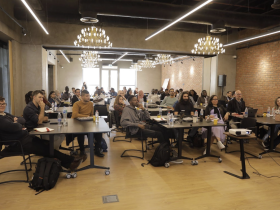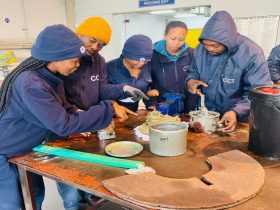The removal of non-indigenous, water-guzzling plants is an important component of the City’s Water Strategy and long-term New Water Programme, which aims to add 55 billion litres per year to the water network by 2026.
This critical and cost-effective action establishes resilient water catchments that will continue to supply the City with water for years to come. It also provides significant social, economic and environmental benefits by creating jobs and allowing indigenous water-wise fynbos to thrive within catchment areas.
The GCTWF business case estimated over 55 billion litres of water – about two months’ water for Cape Town – is being lost every year to invasive alien plants such as pines, gums and wattles in the seven priority sub-catchments that supply water to the main city dams.
In 2021 the City committed R50 million in GCTWF to combat the threat of alien invasive plants. Various other stakeholders also committed to the GCTWF including Cape Nature, South African National Biodiversity Institute (SANBI), The Nature Conservancy (TNC), the World Wide Fund for Nature of South Africa (WWF-SA) and Working on Fire High Altitude Teams (WoF-HAT) since its inception in 2019.
Through the team’s investment and efforts 16,1 billion litres of water were replenished, equivalent to 44 million litres of water per day, by clearing 30 972 initial hectares and 18 740 follow-up hectares of alien plant species. In addition, the GCTWF has created 787 green jobs and employs 151 specialised high angle technicians in the mountain catchment.
The City partnered with The Nature Conservancy (TNC) to clear alien plants in four catchments: Wemmershoek, Steenbras, Berg River and the Atlantis Aquifer core area. Together, they are celebrating the restoration of 3 472 hectares in the first six months of the fiscal year 2023/2024.
‘Our teams have done fantastic work in the first six months of the fiscal year. This cost-effective and sustainable nature-based approach enables us to continue our efforts to secure the City’s water supply and meet future water demands. The terrain where these teams work is difficult and we are appreciative for their dedication.
‘The clearing of alien invasive plants is one initiative of our New Water Programme that will support us to increase available supply capacity by an additional 300 million litres of water a day through alternative means such as desalination, groundwater abstraction, managed aquifer recharge and direct potable water reuse,’ said the City’s Mayoral Committee Member for Water and Sanitation, Councillor Zahid Badroodien.
For the fiscal year 2023/24, the City has committed R25 million to continue clearing activities in the four catchment areas, ensuring that more water reaches our dams and Cape Town maintains a resilient water future.
























Leave a Reply